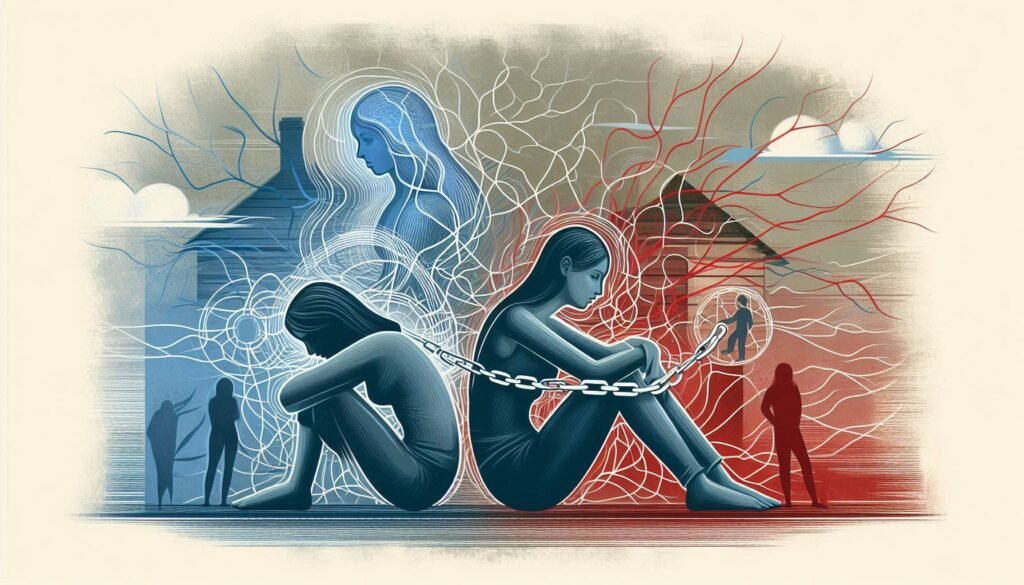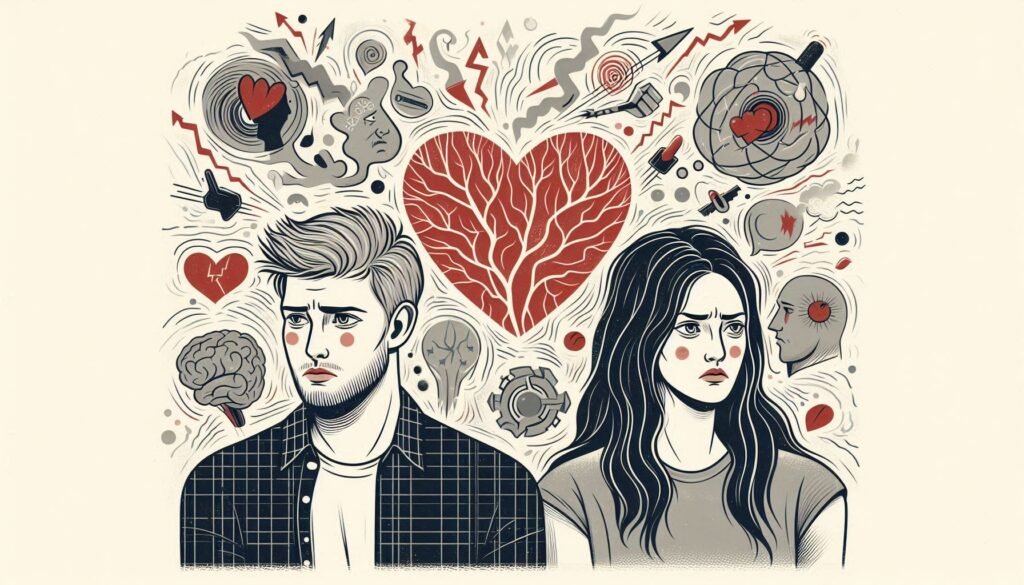Relationships can be a beautiful tapestry woven from love, trust, and mutual support. However, when codependency intertwines with neuroticism, they create complex emotional patterns that can lead to turmoil rather than fulfillment. Codependency patterns in relationships with neurotic individuals often manifest through an imbalance of emotional responsibility, leaving one partner feeling overwhelmed while the other struggles to maintain stability.
Understanding this intricate dynamic is essential for anyone who finds themselves entangled in such partnerships. What drives these behaviors? How do we recognize them? And most importantly—how do we break free from the cycle? Join us as we explore the nuances of codependency and its connection to neurotic traits. This journey will shed light on how these relationships develop and provide insight into healthier communication strategies and therapeutic approaches for renewal and growth.

Defining Codependency: Characteristics and Origins in Relational Contexts
Codependency is a relational dynamic where one partner excessively relies on the other for emotional support and validation. This often leads to an imbalance, with one individual sacrificing their own needs to maintain harmony in the relationship. The characteristic traits of codependency include excessive caretaking, low self-esteem, and difficulty setting boundaries.
The origins of codependent behaviors can often be traced back to childhood experiences. Many individuals grow up in environments where they feel responsible for the emotions of others. These early influences shape their ability to form healthy relationships later in life.
In adult partnerships, codependency manifests as a tendency to prioritize the needs of a neurotic partner over one’s own well-being. Neuroticism—marked by anxiety and emotional instability—often exacerbates this dependency, creating cycles that are hard to break.
Recognizing these characteristics is vital for understanding how they play out in relationships. By identifying these patterns early on, partners can work towards healthier dynamics together.
Neuroticism and Codependency: How Personality Traits Foster Unhealthy Bonds
Neuroticism is characterized by emotional instability, anxiety, and moodiness. Individuals high in neurotic traits often experience intense feelings that can lead to irrational thoughts and behaviors. These emotional fluctuations create a fertile ground for codependency to take root.
In relationships with neurotic partners, one may feel compelled to manage their emotions. This dynamic fosters a sense of responsibility for the partner’s happiness, blurring the lines between support and over-involvement. The caretaker becomes consumed by their partner’s needs while neglecting their own well-being.
The anxious nature of a neurotic individual can trigger heightened sensitivity in the other partner. As they strive to maintain peace, they might suppress their own feelings or opinions, further entrenching codependent patterns. Instead of fostering healthy communication, this leads to resentment and frustration.
Moreover, as both individuals become enmeshed in these dynamics, personal growth stagnates. Each partner relies increasingly on the other for validation and stability instead of developing independent coping mechanisms or emotional resilience.
The Caretaker Complex: Assuming Responsibility for a Neurotic Partner’s Emotions
The caretaker complex often manifests in relationships where one partner displays neurotic tendencies. This dynamic compels the other to assume responsibility for their emotional well-being. In such scenarios, feelings of guilt and obligation dominate interactions.
Caretakers may believe they can “fix” or support their partners by managing their emotions. However, this desire stems from a deeper fear of abandonment or rejection. They might sacrifice personal needs to ensure harmony in the relationship.
This pattern creates an unhealthy reliance on each other. The neurotic partner leans heavily on the caretaker for validation and support while avoiding accountability for their own emotional state. Conversely, caretakers frequently feel overwhelmed and drained by this unbalanced give-and-take.
As a result, both individuals become trapped within these roles, perpetuating codependency patterns in relationships with neurotic individuals. Awareness is essential to break free from this cycle and foster healthier dynamics that allow both partners to grow independently.
Boundaries Blurred: Challenges in Maintaining Individuality with Neurotic Partners
Navigating relationships with neurotic partners often leads to blurred boundaries. This can create an environment where individuality struggles to thrive. When one partner exhibits high levels of anxiety or emotional volatility, the other may feel compelled to take on their emotional burdens.
In these dynamics, a caretaker mentality often emerges. One person prioritizes the other’s needs at the expense of their own well-being. This imbalance diminishes personal identity and fosters dependency, making it challenging for both partners to express themselves authentically.
The difficulty in setting clear boundaries arises from fear—fear of conflict, abandonment, or further escalation of emotional distress. As a result, individuals may suppress their feelings and desires to maintain harmony within the relationship.
Over time, this pattern erodes self-esteem and prevents healthy forms of expression. The inability to define personal space can lead to resentment and frustration among partners who are entangled in each other’s emotions rather than supporting individual growth.
Emotional Manipulation: Unintentional Consequences of Neurotic Behavior
Emotional manipulation can often emerge in relationships where one partner displays neurotic behavior. These individuals may not intend to manipulate, but their insecurities and anxiety create a dynamic that fosters reliance on the other person for emotional stability.
When a neurotic partner experiences intense feelings of fear or jealousy, they might resort to guilt-tripping or passive-aggressive tactics. This unintentional manipulation puts pressure on the caretaker partner, who feels responsible for alleviating these emotions. Such interactions can lead to misunderstandings and resentment over time.
The cycle continues as both partners struggle with their own emotional needs. The neurotic individual seeks validation while the caretaker becomes increasingly drained by an incessant need to provide reassurance. This imbalance creates tension within the relationship.
Recognizing these patterns is crucial for both partners’ well-being. Awareness allows them to address underlying issues rather than inadvertently perpetuating harmful behaviors that stem from unmet emotional needs.
Self-Esteem Issues: Impact of Codependent Relationships on Personal Worth
Codependent relationships can significantly affect an individual’s self-esteem. When one partner is neurotic, the other often feels compelled to manage their emotions and needs. This caretaking role may lead them to neglect their own feelings and desires.
As time goes on, the codependent partner might start to believe their worth hinges on their ability to support the neurotic individual. They may feel inadequate or unlovable if they fail in this role, leading to a constant state of anxiety about maintaining the relationship.
This dynamic creates a cycle where personal identity becomes intertwined with another’s emotional stability. The codependent person risks losing sight of who they are outside of this partnership, further diminishing their sense of self-worth.
Moreover, when validation comes solely from supporting another person, it stunts personal growth. This reliance on external approval fosters insecurity and makes it challenging for individuals to nurture a healthy self-image independent of others’ needs or expectations.
Breaking the Cycle: Recognizing and Addressing Codependent Patterns
Breaking the cycle of codependency requires a keen awareness of existing patterns. Recognizing these behaviors is the first step toward change. Look for signs such as prioritizing your partner’s needs over your own or feeling responsible for their emotional state. These actions often indicate a deeper issue that needs addressing.
Awareness can spark meaningful conversations with yourself and your partner. Discussing feelings openly fosters understanding and may reveal underlying emotions driving the codependent behavior. Acknowledging shared struggles can strengthen bonds, but only if both partners are ready to engage in this process.
Establishing new habits is crucial for breaking free from detrimental cycles. Start by setting boundaries around acceptable behavior and personal space. This creates a healthier dynamic where both individuals feel valued and heard, promoting independence within the relationship.
Seek support when needed—whether through friends, family, or professional resources. Having an outside perspective provides clarity and guidance while navigating these challenging waters together.
Communication Strategies: Fostering Healthy Dialogue in Neurotic Relationships
Effective communication is vital in any relationship, especially with neurotic partners. It’s essential to approach discussions with empathy and patience. Listening actively can help validate your partner’s feelings without amplifying their anxieties.
Utilizing “I” statements rather than “you” accusations fosters a more constructive dialogue. For instance, saying “I feel overwhelmed when…” instead of “You always make me feel…” shifts the focus from blame to personal experience. This technique encourages openness and reduces defensiveness.
Establishing regular check-ins can also enhance communication. Set aside time each week to discuss emotions, concerns, or joys without distractions. This dedicated space allows both partners to express themselves freely and reinforces emotional safety.
Practicing mindfulness during conversations helps maintain calmness amid potential volatility. By focusing on breathing and staying present, you reduce knee-jerk reactions that often escalate conflicts in neurotic partnerships. These strategies create a foundation for healthier interactions over time.
Therapeutic Approaches: Treating Codependency in Partnerships with Neuroticism
Therapeutic approaches to codependency patterns in relationships with neurotic individuals often begin with individual therapy. This provides a safe space for partners to explore their feelings and behaviors without judgment. Cognitive-behavioral therapy (CBT) can be particularly effective, as it helps individuals identify negative thought patterns that contribute to codependent dynamics.
Group therapy is another valuable option. It allows participants to share experiences and gain insights from others facing similar struggles. The sense of community fosters understanding and reduces feelings of isolation, which are common in codependent relationships.
Couples therapy also plays a crucial role in addressing these issues together. A trained therapist can facilitate open communication between partners, helping them understand each other’s emotional needs while promoting healthier interaction patterns.
Mindfulness-based therapies may enhance emotional regulation for both partners. Practicing mindfulness encourages awareness of one’s thoughts and emotions, leading to more constructive responses rather than reactive behavior typical in neurotic partnerships.
Self-Care and Independence: Rebuilding Identity Beyond Codependent Dynamics
Rebuilding identity beyond codependent dynamics is an essential journey for anyone involved in relationships with neurotic individuals. This process begins with self-awareness. Understanding your own needs and desires is crucial in breaking free from unhealthy patterns.
Establishing boundaries plays a key role too. Knowing where you end and your partner begins helps to maintain individuality, allowing both partners to grow separately while still nurturing the relationship. Prioritize activities that inspire joy and fulfillment outside of the partnership, as these pursuits can significantly boost self-esteem.
Engaging in practices such as meditation or journaling can enhance emotional clarity, making it easier to recognize when codependency patterns arise. Additionally, seeking support through therapy or support groups provides a safe space for reflection and healing.
As you foster independence, remember that it’s perfectly normal to crave connection; however, healthy relationships thrive on mutual respect rather than dependency. Surround yourself with positive influences who encourage personal growth and authenticity.
Embracing self-care not only nurtures your well-being but also contributes positively to all aspects of life—including future partnerships—creating healthier connections moving forward.


